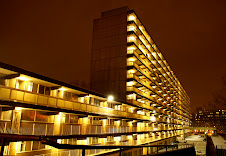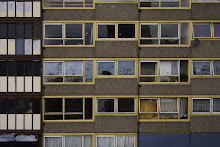HOW I CAME TO THE ELEPHANT:
The first time I lived in England as an adult was in the fall of 87, when I came here with my girlfriend Marie. I’d met Marie in Vancouver, after she’d come back from a year in London, and she’d told me about her London squatting life which seemed very exotic, hip and slightly scary to someone like me whose idea of a big metropolis was Montreal (where I’d just spent a year) and eventually she dragged me back to London with her. I can’t remember why exactly we ended up on the Elephant – she had friends who lived on the Bramwell, we didn’t know enough about squatting to break out own place so somebody found us an empty room – and we moved in.
I’d been to England often enough as a kid, passing through London on the way to see my grandparent’s up in Leeds. I’d been into punk rock for a couple of years, liked all the English bands like Joy Division, the Stranglers, the Jam, GBH, the Exploited. I’d even heard stories about people living on the shitty estates in south London with the damp whistling through the cracks, the loaf of white bread under the table, the pints of sour milk in the fridge. Everyone waiting for the dole cheque so they could go to the pub and get drunk, and spent needles turning up in the mornings on the bathroom floor. In Canada we had skinheads, hardcore, mods imported wholesale from the UK.
In the back of my mind, England was the country of my grandparents. I expected convivial neighborhood pubs, red postal vans, a friendly wave from the corner grocer as I went down to buy milk. Even squatting from a distance seemed romantic – a kind of grittier version of the artist’s communities I knew in Montreal.
We moved in next door to Marie’s friend Scottish Bob, who had a squat in Bramwell House. We could have lived with Bob, but his flat had no heat and most of the rooms had broken windows – he seemed to spend most of his time at home in bed, reading. Instead, we moved in with a South African named Dave, whose flat at least had some windows. One room had been painted bright red by a previous resident but we had a nice view out the big picture window of a green, and the curve of Harper Road and the little library across the road.
At the time, the Elephant was mostly Irish. You heard the Irish brogue mixed in with the Cockney in pubs and on the terraces, and one of the pubs around the Bramwell was rumoured to be an IRA hang-out. I heard it was even bombed at one point.
It was definitely a poor area. Enormous women in kerchiefs hung their washing in the terraces and yelled at their kids running around in the courtyard below. A lot of flats were boarded up, and ripe for squatters but the locals hated squatters for the most part, seeing them as druggies, vandals, or worse. Since this element did exist, you couldn’t really blame them
But most squatters were like us – outsiders to London, lacking the income, references or connections to get a council flat. For anyone coming to London in the 1980’s, squatting was the best and sometimes the only option and the big estates in the Elephant and down Walworth Road were natural starting points, since they had so many empty flats and it might be months, even years, before Southwark Council got around to evicting anyone.
Marie had already lived in squats just south of the garanguatan and truly horrific North Peckham estate for a year before she came back to Vancouver and met me, but at the first the whole concept flipped me out. The flat was damp and smelled of mould: the cold leaked in through the windows and the paint peeled from the walls. Outside, the grey light hardly seemed to penetrate the terraces, and the children hanging around the terraces glanced us over suspiciously. Gangs of drunk white men mobbed the New Kent Road on weekend nights.
The mall – it was grey then – seemed both decrepit and menacing, with the old people wearily pulling their shopping carts along the airport wing-like atmosphere of the second level, past the drunks hanging around on the benches. The phone boxes had either been smashed or carved up with graffiti, and gangs of kids, black and white, hung around the lower levels in the afternoons.
Then there were the tunnels below the roundabout. With the drunks hanging in the deepest levels, bumming change and drinking cans of Special Brew, the graffiti and the smashed out lights, they seemed both dangerous and absurd. With the tunnels, the concrete rampways around the mall and the orange formica interiors in the little coffee bars inside, it seemed like something out of Clockwork Orange.
But what made the neighborhood seem truly sinister to me was the ocean-liner sized structures flanking New Kent Road; the mighty Heygate Estate. I had never seen anything like them before. The lead tower stretched the length of three city blocks, rising level upon level of doorways and windows and green terrace fencing like a walll of plastic lawn dividers – our estate, a warren of dirty brick, seemed human by comparism. On the concrete gangway at the bottom, someone had scrawled ‘Vote Labour’ and we imagined that our estate had been built by a compassionate Labour government while the monstrosity across the street was the legacy of the heartless Tories.
The first thing Marie had me do was sign on. The dole office was in the Alexander Fleming Building, which had just been voted the ugliest building in Britain. Perched on the edge of the roundabout, it was a Mie Van der Rhoe (??) inspired mass of cubes and long edges – modernism personified. Every window was streaked with dust, the paint was peeling – it was decrepit and past it’s prime even while still young.
The dole office was up some concrete stairs where people lay around smoking and glancing suspiciously over everyone who passed. Inside were punks with weedy Mohawks and the proverbial dogs on lengths of string, and rows of beaten looking people sitting on the hard plastic seats, waiting for their number to come up. Pexiglass separated the case workers from their cases and at one of the stalls a huge Jamaican woman was screaming at a white male case worker, hitting the pexiglass with her closed fists (later, I found out that most the men and women sitting behind the pexiglass had been drawn from the ranks of those waiting on the hard plastic seats.
When my number came up, I recited the story Marie had given me, that I’d been fruit picking in Greece or France, run out of work and money, and so needed the £28.50 a week in Unemployment Benefit to survive. Dreading a barrage of uncomfortable questions, like why didn’t I just go out and get a job, I was relieved when the case worker, probably just as relieved to be dealing with a mildly fraudulent Canadian as I was to be getting my cheque, told me my UB40 would reach me in two weeks.
NEXT: HOW I CAME TO LOVE THE ELEPHANT.
Subscribe to:
Post Comments (Atom)







No comments:
Post a Comment